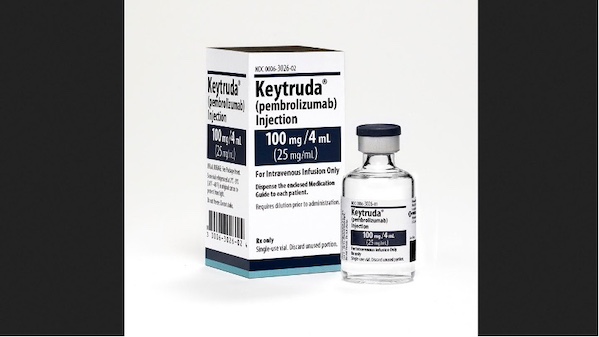Merck’s Keytruda receives approval greenlight from EU CHMP
October 18, 2023
Source: drugdu
 319
319

The European Medicines Agency’s Committee for Medicinal Products for Human Use (CHMP) confirmed a positive recommendation for Merck’s Keytruda (pembrolizumab) as part of a first-line treatment for advanced gastric and gastroesophageal junction cancer (GEJ).
Keytruda, an anti-programmed death receptor-1 (PD-1) therapy, would be used in conjunction with fluoropyrimidine- and platinum-containing chemotherapy in adults whose tumours express PD-L1 with a combined positive score (CPS) ≥1.
The intravenously administered drug is designed to improve the immune system’s anti-tumour response by inhibiting the binding of PD-1 to its ligands PD-L1 and PD-L2, thereby activating tumor-fighting T-cells. Keytruda is also being studied as a treatment for hepatobiliary, oesophageal, pancreatic, and colorectal cancers.
The EU CHMP’s positive recommendation was based on results from the Phase III KEYNOTE-859 (NCT03675737) study, a randomised, double-blind clinical trial evaluating the efficacy of Keytruda plus chemotherapy as a first-line treatment for human epidermal growth factor receptor-2 (HER2) negative, unresectable or metastatic gastric cancer.
The study met its primary endpoint of overall survival in November 2022, reporting that treatment with Keytruda and chemotherapy resulted in “statistically significant” and “clinically meaningful improvement” compared to chemotherapy exclusively.
Secondary endpoints of progression-free survival and overall response rate were also met. No new safety concerns were found.
The study data also prompted the United States Food and Drug Administration (FDA) to accept Merck’s supplemental biologics licence application (sBLA) for the drug in the treatment of gastric cancer.
The positive opinion issued to Merck is one of several opinions released by the EU CHMP today. Amylyx’s appeal for ALS drug, Albrioza/Relyvrio (AMX0035), was rejected by the committee following an initial negative opinion in June 2023. Santhera’s DMD drug, Agamree (vamorolone), however, received a positive recommendation.
Merck’s greenlight is a bounce back from the Phase III KEYNOTE-585 (NCT03221426) study failure earlier in the year.
In June, Merck reported that the study for locally advanced resectable gastric and GEJ adenocarcinoma using a combination of Keytruda and neoadjuvant chemotherapy followed by Keytruda and adjuvant chemotherapy, and finally Keytruda monotherapy failed to deliver statistically significant results for event-free survival (EFS), one of their two primary endpoints.
Other trials evaluating Keytruda as a gastrointestinal cancer treatment include a Phase III KEYNOTE-811 (NCT03615326) trial as a first-line treatment for advanced HER2-positive gastric cancer, a KEYNOTE-585 trial for early-stage gastric cancer, and a Phase III LEAP-015 (NCT04662710) study for advanced and metastatic gastric cancer.
Keytruda received accelerated approval from the United States Food and Drug Administration (FDA) as a treatment for advanced HER2-positive gastric cancer in May 2021 and European Commission (EC) approval in August of this year.
https://www.pharmaceutical-technology.com/news/mercks-keytruda-receives-approval-greenlight-from-european-commission/?cf-view
Read more on
- The first subject has been dosed in the Phase I clinical trial of Yuandong Bio’s EP-0210 monoclonal antibody injection. February 10, 2026
- Clinical trial of recombinant herpes zoster ZFA01 adjuvant vaccine (CHO cells) approved February 10, 2026
- Heyu Pharmaceuticals’ FGFR4 inhibitor ipagoglottinib has received Fast Track designation from the FDA for the treatment of advanced HCC patients with FGF19 overexpression who have been treated with ICIs and mTKIs. February 10, 2026
- Sanofi’s “Rilzabrutinib” has been recognized as a Breakthrough Therapy in the United States and an Orphan Drug in Japan, and has applied for marketing approval in China. February 10, 2026
- Domestically developed blockbuster ADC approved for new indication February 10, 2026
your submission has already been received.
OK
Subscribe
Please enter a valid Email address!
Submit
The most relevant industry news & insight will be sent to you every two weeks.



